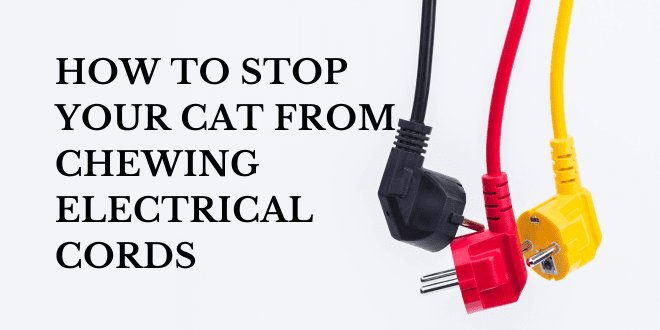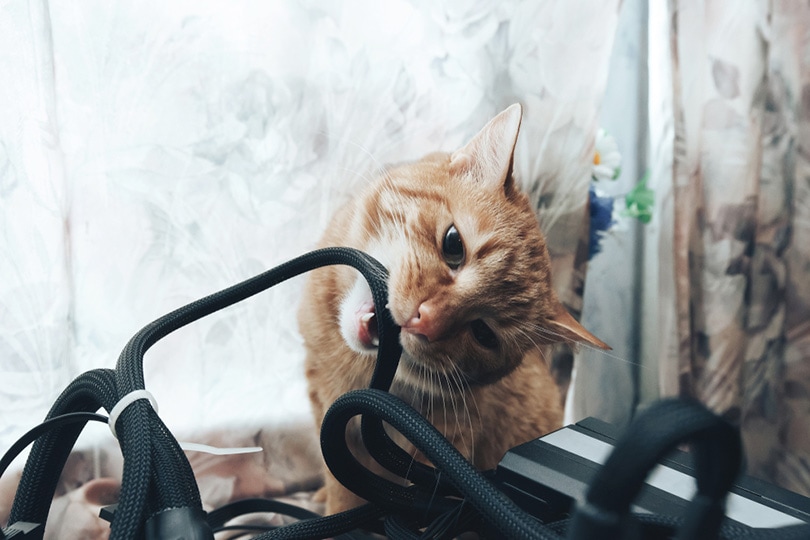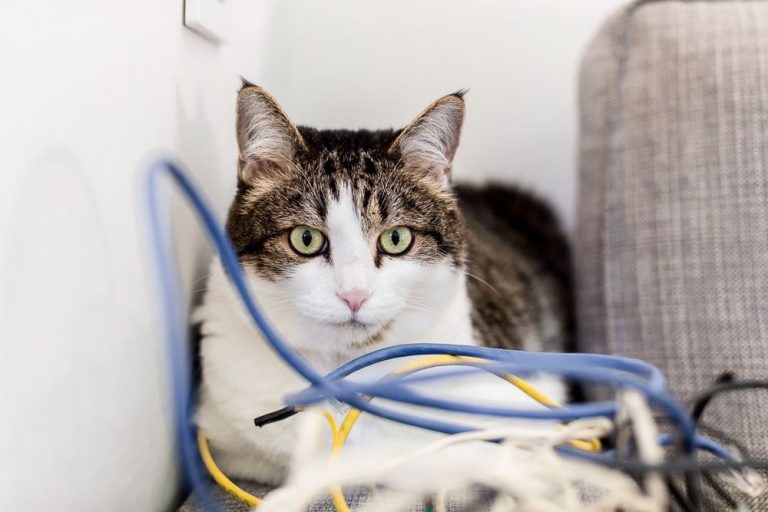To stop your cat from chewing electrical cords, try these simple steps. Read on to learn how to protect your cords from your curious feline.
Cats are naturally attracted to the texture and movement of electrical cords, and their chewing can be dangerous and damaging. Not only can it harm your cat, but it can also pose a fire hazard. Therefore, taking preventive measures to protect your cat from the cords is essential.
We will discuss some practical strategies to end this behaviour and protect your cat and electrical cords. By following these steps, you can create a safe environment for your cat and avoid any unnecessary accidents or damage caused by cord-chewing.
Understanding The Issue
Understanding the issue and taking the necessary steps to prevent your cat from chewing electrical cords is essential. Protecting cords with covers or deterrent sprays can help keep your furry friend safe and your electronics intact.
Understanding the Issue
If you’re a cat owner, you may have experienced the frustration of finding your feline friend chewing on electrical cords. Not only is it a nuisance, but it can also be hazardous for your cat. Understanding why cats engage in this behaviour and the potential risks involved is essential to finding practical solutions to prevent them from chewing electrical cords in your home.
Why do cats chew electrical cords?
Cats are naturally curious creatures, and their penchant for exploration can lead them to investigate and nibble on anything that catches their attention. Electrical cords can be especially enticing for cats with their dangling and wiggling ends. Additionally, the texture of cords can offer an appealing sensation for cats to chew on, similar to how they might chew on other objects to satisfy their instincts.
Dangers of cat chewing electrical cords
While it may initially seem harmless, cats chewing on electrical cords can have serious consequences. Here are some of the dangers associated with this behaviour:
1. Electric shock: Chewing on live electrical cords can expose your cat to the risk of electric shock. This can cause severe burns, tissue damage, and even cardiac arrest in some cases. The electrical current can quickly travel through a cat’s body, leading to life-threatening injuries.
2. Fire hazards: Cats chewing on cords can damage the electrical insulation, exposing wires. This increases the risk of a short circuit, potentially leading to a fire hazard in your home. Protecting your cat and property from such hazards should be a top priority.
3. Injuries: Chewing on cords can lead to various injuries for your cat. They may accidentally swallow pieces of the cord, resulting in gastrointestinal obstructions. Additionally, if they get entangled in a cord, it can cause strangulation or injuries from attempts to free themselves.
To ensure your cat’s safety and prevent any potential accidents, it is crucial to take proactive measures to stop them from chewing on electrical cords. Following the appropriate steps and implementing effective strategies can significantly mitigate the risks associated with this behaviour. Stay tuned for our upcoming blog post to share practical tips and techniques for stopping your cat from chewing electrical cords.

Preventing Cat Chewing
Cats are curious creatures who love to explore their surroundings with their mouths. This can sometimes lead to dangerous situations, especially when it comes to chewing on electrical cords. You can try a few practical strategies to prevent your cat from damaging cords and potentially harming themselves. You can effectively stop your cat from chewing on electrical cords by cat-proofing the environment, using deterrents, and providing alternative options. Let’s explore these methods in detail.
Cat-proofing The Environment
Cat-proofing your home is essential to preventing your furry friend from chewing on electrical cords. By creating a safe and cord-free environment, you eliminate the temptation for them to sink their teeth into these potentially hazardous objects. Here are a few ways to cat-proof your living space:
- Keep cords out of sight: Secure loose cords behind furniture or use cord organizers to hide them from your cat’s view. By keeping cables out of sight, you reduce their curiosity.
- Use cord covers: Attach plastic cord covers or wrap electrical cords in tubing explicitly designed for this purpose. These covers are a physical barrier preventing your cat from accessing the cords.
- Redirect cords away from the floor: Use hooks or clips to position cords higher up on walls or ceilings, away from your cat’s reach. This makes it harder for them to access and chew on the cords.
Using Deterrents
Deterrents are an effective tool for deterring your cat from chewing electrical cords. These methods create an unpleasant experience for your cat, helping them associate cords with negative consequences. Here are a few deterrent options to consider:
- Bitter sprays: Apply a bitter-tasting spray to the cords. The unpleasant taste discourages your cat from chewing on them. Make sure to choose a pet-safe bitter spray and test it on a small section of the cord first to ensure it doesn’t damage the cord.
- Citrus scents: Cats typically dislike the smell of citrus. Rubbing citrus-scented essential oils or placing citrus peels near cords can deter them from attempting to chew on them.
- Noise distractions: Create noise distractions near cords to startle your cat when they approach. For example, a motion-activated noise-maker or a small can filled with coins can discourage them from getting too close.
Providing Alternatives
Often, cats chew on electrical cords due to boredom or a lack of suitable alternatives. You can reduce their interest in cords by fulfilling their chewing needs with appropriate options. Provide these enticing alternatives to keep your cat entertained:
| Alternative Options |
|---|
| Interactive toys: Invest in interactive toys such as puzzle feeders or treat-dispensing balls. These toys stimulate your cat mentally, diverting their attention from cords. |
| Catnip-filled toys: Catnip-filled toys are excellent for redirecting your cat’s chewing habits. The enticing smell of catnip often attracts cats, keeping them occupied and less likely to chew on cords. |
| Chew toys: Provide your cat with various chew toys specifically designed for cats. These toys help satisfy their natural chewing instincts and offer a safe outlet for their need to gnaw. |
Implementing these strategies will help you prevent your cat from chewing electrical cords, ensuring their safety and your peace of mind. By cat-proofing the environment, using deterrents, and providing appropriate alternatives, you can create a cord-free space that your cat will be less tempted to explore with their teeth. Remember, consistency and patience are essential when training your cat. With time, they will learn what is acceptable to chew on and off-limits.
Training And Behavioral Solutions
Training and behavioural solutions are essential when preventing your cat from chewing electrical cords. By addressing this unwanted behaviour, you can protect your cat and your belongings from potential harm. You can implement several effective strategies to train your cat and discourage their chewing habits.
Positive Reinforcement Training
Positive reinforcement training can effectively teach your cat not to chew on electrical cords. This technique involves rewarding your cat with praise, treats, or playtime when they demonstrate the desired behaviour of ignoring the cords. Remember to provide positive reinforcement immediately after observing your cat’s good behaviour to reinforce the connection.
Using Taste Aversion Techniques
Taste-aversion techniques can also deter your cat from chewing on electrical cords. These methods involve applying a taste deterrent to the cords, making them unappealing to your cat. Several taste-deterrent products are available on the market, specifically formulated to discourage chewing. You are choosing a safe product for your cat that won’t cause harm if ingested.
Seeking Professional Help
If your cat continues to chew on electrical cords despite your efforts, seeking professional help may be necessary. A veterinarian or a professional animal behaviourist can provide expert advice tailored to your cat’s needs and circumstances. They can assess the underlying causes of the behaviour and recommend specialized training techniques or interventions to address the issue effectively.
:strip_icc()/cat-chewing-electrical-wires-554022-08-2f11904060a04d8282982c1400b3a5ce.jpg)

Frequently Asked Questions Of How To Stop Your Cat From Chewing Electrical Cords
How Can I Stop My Cat From Chewing Electrical Cords?
To stop your cat from chewing electrical cords, you can try covering the cords with electric cord covers or tape, spraying them with a cat deterrent spray, providing alternative chew toys for your cat, keeping cords out of reach or hidden, and offering distractions or mental stimulation to redirect your cat’s behaviour.
Conclusion
To effectively prevent your cat from chewing electrical cords, it’s crucial to implement a combination of proactive measures and redirection techniques. You can safeguard your feline companion and electrical devices by providing alternative chewing options, using taste-deterrent sprays, keeping cables out of sight, and creating cat-safe spaces.
Consistency is critical when training your cat, so be patient and persistent. With these strategies, you can create a safe environment and end your cat’s destructive chewing habits.

